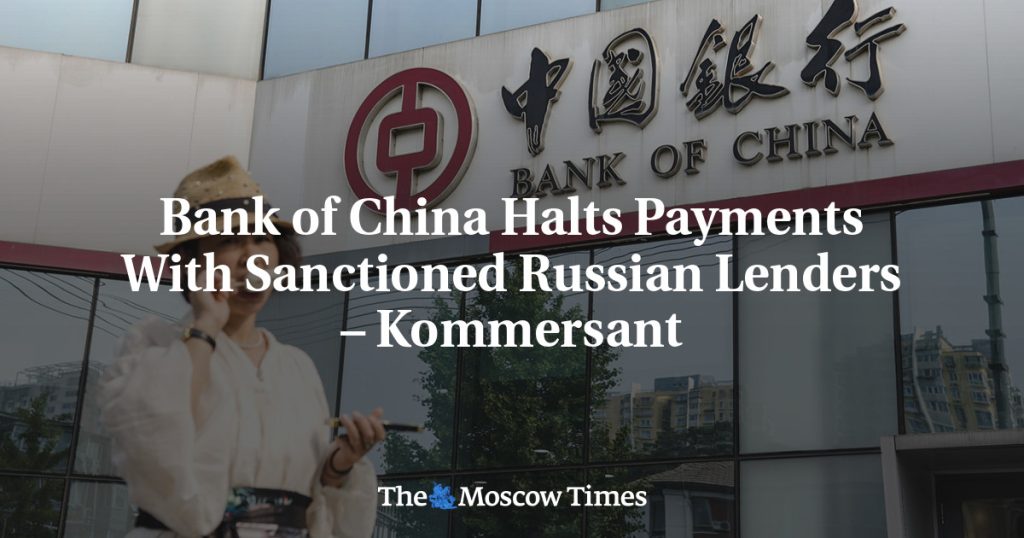The Russian division of the Bank of China has decided to suspend operations with Russian lenders who have been sanctioned by the United States in order to avoid facing secondary sanctions. This decision was made to protect the Bank of China from potential repercussions due to their connections with sanctioned entities. The Bank of China’s Russian division, which specializes in yuan payments between Russia and China, is one of the largest Chinese banking subsidiaries in the country, with assets totaling 592.4 billion rubles. Despite this move, experts believe that this decision may lead to increased fraud risks as transactions may now be handled by less transparent intermediaries.
Following the widening of U.S. sanctions against Russia, which now include targeting foreign financial institutions dealing with sanctioned individuals or entities, the Bank of China’s decision to suspend payments with sanctioned local banks comes as part of a broader effort to comply with the new regulations. Amid concerns about potential fraud risks and lack of control over transactions, the decision may have negative implications for the Russian market. The new restrictions have prompted the establishment of an alternative payment channel for business between China and Russia, involving smaller regional banks near the Russian-Chinese border in order to continue operations without being affected by U.S. sanctions. This workaround is seen as a temporary solution to help Moscow avoid scrutiny from the U.S. Treasury Department.
The Bank of China has yet to provide any comments on their decision to suspend operations with sanctioned Russian lenders, as reported by Kommersant. The move suggests the tightened grip of U.S. sanctions and their impact on foreign financial institutions. An anonymous industry insider interviewed by the newspaper expressed concerns about the additional costs and processing time that may result from the suspension of payments with sanctioned entities. While the decision may protect the Bank of China from facing secondary sanctions, it also highlights the challenges and complexities faced by financial institutions operating in sanctioned environments.
The new payment scheme set up between China and Russia after President Vladimir Putin’s visit to Beijing allows for continued business transactions through smaller regional banks, enabling Moscow to avoid U.S. sanctions for the time being. This workaround is seen as a way to navigate the sanctions landscape and maintain economic ties between the two countries. The Chinese yuan has become a dominant currency in settling Russian exports, now accounting for over a third of all exports, a significant increase since the full-scale invasion of Ukraine in 2022. The deepening economic relationship between China and Russia has become crucial for both countries in the face of mounting sanctions and geopolitical challenges.
The sanctions imposed by the U.S. have pushed foreign financial institutions, including the Bank of China, to reconsider their relationships with sanctioned Russian entities. Despite the challenges posed by the sanctions, China has emerged as a key economic partner for Russia, with trade between the two countries showing significant growth in recent years. The reliance on the Chinese yuan for settling exports underscores the importance of the economic partnership between Russia and China, particularly in light of geopolitical developments in the region. The collaboration between these two countries is seen as a way to counterbalance the impact of Western sanctions and enhance economic cooperation in the face of global uncertainties.
The evolving financial landscape in light of U.S. sanctions against Russia underscores the complexities faced by foreign financial institutions operating in sanctioned environments. The Bank of China’s decision to suspend operations with sanctioned Russian lenders sheds light on the challenges and risks involved in navigating the sanctions regime. As alternative payment channels are established to facilitate business between China and Russia, the impact of sanctions on financial institutions, trade, and economic partnerships remains a key concern for stakeholders. Despite these challenges, the deepening economic ties between China and Russia signal a strategic alignment between the two countries in the face of external pressures and geopolitical dynamics.


